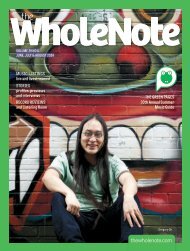Create successful ePaper yourself
Turn your PDF publications into a flip-book with our unique Google optimized e-Paper software.
Beat by Beat / Classical & BeyondRevisiting the 20th CenturyALLAN PULKERImagine that we’ve just learned that some concert is a special event for WholeNote readers.)a number composers have been discovered turedon this disc were not victims of the– and the names of these composers are Men- response might wellbe along the lines of“What an important discovery!The history ofEuropean music in the19th century will haveto be rewritten to incorporatethese previ- nomenonof newly dis-different angle, what,then, is our response tothe news that the musicof a number of verygood early- to mid-20th century composershas actually been discovered, performed andrecorded? The names of some of them areBusch, Braunfels, Kahn, Reizenstein, Rönt-not familiar names, it’s easy to dismiss themas “minor composers.” seven years ago the Royal Conservatory appointedguitarist Simon Wynberg artistic dir-ARC (Artists of the Royal Con-been doing the programmingand research for ARC, and hasbeen in contact with musicologists,record labels and institutionswho are researching less-century, many of them victimsof the Holocaust.ARC gave its inaugural performancesin the 2002-03 season.Since then it’s given concertsnot only in Toronto but2011, and concerts at the Concertgebouw.bleto continue to perform and record unjust--alupheavals of the 20th century, as well asarycomposers. current news from ARC is the release of itsthird CD, , on the morningof <strong>May</strong> 6, with a short performanceof excerpts from this disc. (The free mini-The Royal Conservatory’s ARC Ensemble.ARC Ensemble artisticdirector Simon Wynberg.in very different ways. One of them AdolfBusch, was not Jewish, and the form histhe other, Walter Braunfels, was half Jewish,and survived the war by hiding in a churchin the German village of Überlingen.Consequently the reason their music hasbeen forgotten is not because it has beenfact the by Braunfels was actuallypublished in the 1950s.Wynberg bought a score andset of parts for the ensemblefrom the publisher – brand newbut yellow with age. The by Adolf Busch, despiteBusch’s having made quite aname for himself in the USA asa violinist and as a co-found-never published – more a casualtyof the exigencies of life,and the disruption of forcedemigration than anything else.The ensemble’s performancesand recording were all donefrom a hand-written manuscript,presumably by the composer himself. liner notes, written by ARC artistic director,Simon Wynberg, on the reasons for theobscurity of these two composers and theirwar,” he writes, “there was an understandabledesire to protect and encourage theled eventually to “the hegemony of the avantgarde”and the dismissal, particularly in universities,as reactionaries “those who had followedtraditional musical avenues.” Braunfelsand Busch were both masters of traditionalesprit orc h estraAlex Paukno reasonto pan icSUNDAY, MAY 16, <strong>2010</strong>8:00 p.m: Concert7:<strong>15</strong> p.m: Pre-concert talkJane Mallett Theatre atthe St. Lawrence Centre for the ArtsconductorsopranoProgramme:OrionVermeer Pictures(concert suite for orchestra fromthe opera Writing to Vermeer)No reason to panic(for wind ensemble and six basses)Gitanjali (for soprano and orchestra)Tickets:41 6.366.77231.800.708.6754OR WWW. STLC.COMWWW. ESPRITORCH ESTRA.COM<strong>May</strong> 1 - June 7, <strong>2010</strong> THEWHOLENOTE.COM 11


















